If you’re dealing with ongoing digestive problems like heartburn or trouble swallowing, seeing a GERD specialist could change everything. These experts are great at figuring out and treating GERD. They can help you find ways to make your digestion better.
Table of Contents
ToggleThis article will walk you through what happens when you visit a GERD specialist. We’ll cover everything from the first meeting and check-up to different tests and treatments. It’s useful whether you’re new to GERD or have been dealing with it for a while. It aims to make the process clearer and help you start on the path to better digestion.
Knowing what to expect from a GERD specialist can make you feel more ready and confident. Remember, your health is the most important thing. A skilled GERD specialist can offer the care and knowledge you need for better health.
Understanding GERD and Its Symptoms
GERD, or gastroesophageal reflux disease, is a common digestive issue. It happens when stomach acid or contents flow back into the esophagus. This can cause discomfort and harm the esophagus’s lining over time.
It’s important to know about GERD’s definition, causes, and symptoms. This helps in getting the right medical care.
What is GERD?
GERD is a chronic condition. It happens when the muscle at the stomach’s bottom relaxes too much. This lets stomach contents flow back into the esophagus.
This can cause a lot of discomfort and might harm the esophagus if not treated.
Common Symptoms of GERD
The main symptoms of GERD are:
- Persistent heartburn
- Difficulty swallowing (dysphagia)
- Regurgitation of food or sour liquid
- Chronic cough or hoarseness
- Chest pain or discomfort
Some people with GERD might also have trouble sleeping, bad breath, or tooth enamel erosion. These symptoms can be different for everyone. If they don’t go away or get worse, seeing a doctor is a good idea.
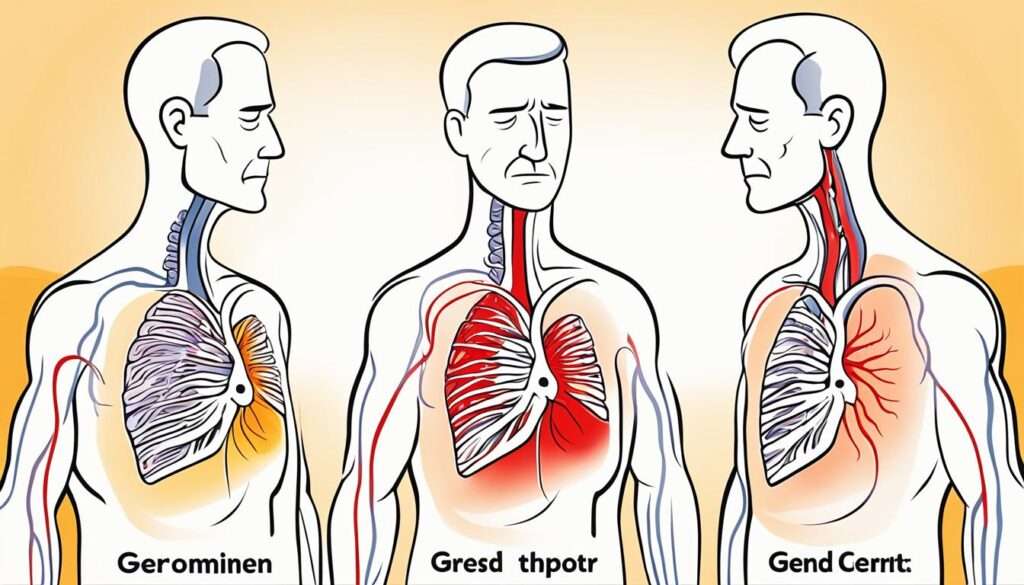
Why See a GERD Specialist?
If you’re dealing with chronic heartburn or other digestive problems, a GERD specialist can help. These experts, like gastroenterologists, know a lot about GERD (Gastroesophageal Reflux Disease). They can give you the best care for your specific needs.
A GERD specialist offers many benefits:
- They do a detailed check-up, look at your health history, and run tests to find out what’s causing your GERD.
- They create a treatment plan just for you, focusing on your symptoms for lasting relief.
- They know about the newest ways to treat GERD, including both medicines and surgery, so you get the best care.
- They help you keep track of your health, change your treatment as needed, and prevent GERD complications.
Working with a GERD specialist, like a gastroenterologist or digestive health expert, is key to getting rid of GERD symptoms for good. If you’re having trouble with GERD, don’t wait to get their help.
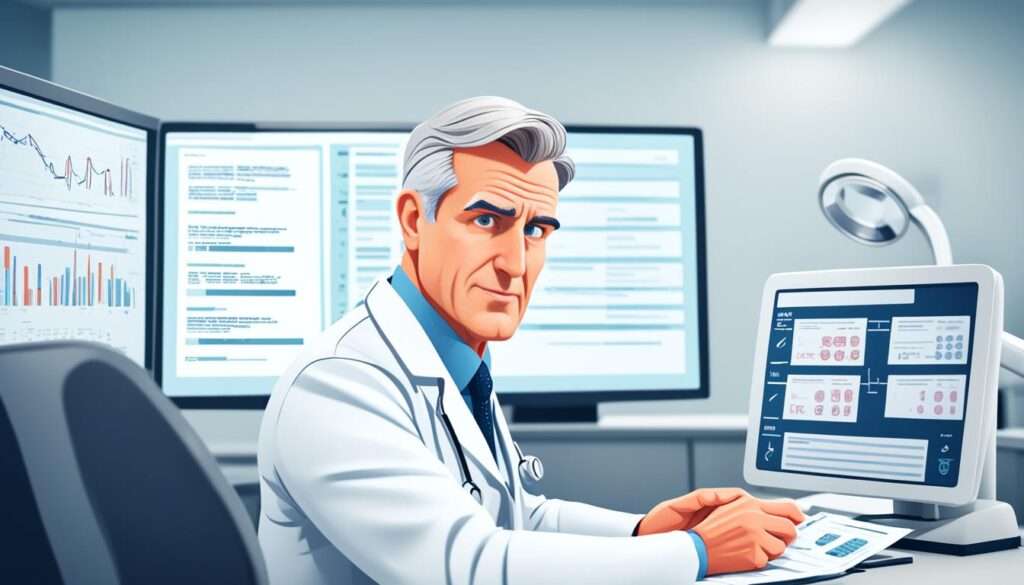
Preparing for Your Appointment
Getting ready for your visit to a GERD specialist is key. Bring any important medical records you have. This includes previous test results, lists of medications, and a summary of your health history. This info helps your GERD specialist understand your situation better and offer the right advice.
What to Bring
- Medical records, including test results, diagnostic reports, and previous treatment history
- A list of all medications, supplements, and over-the-counter drugs you are currently taking
- A detailed summary of your medical history, including any other health conditions you have
- A food diary or log of your dietary habits, if available
Questions to Ask
Make a list of questions before your GERD consultation. This ensures you get the info you need. Some important questions to ask your GERD specialist include:
- What is the likely cause of my GERD symptoms?
- What are the most effective treatment options for managing my GERD?
- How can lifestyle changes, such as diet and exercise, help control my GERD?
- What diagnostic tests may be necessary to better understand my condition?
- How can I prevent GERD flare-ups and minimize the long-term impact of the condition?
Being proactive in your preparation will help you make the most of your GERD appointment. It ensures a productive and informative talk with your specialist.
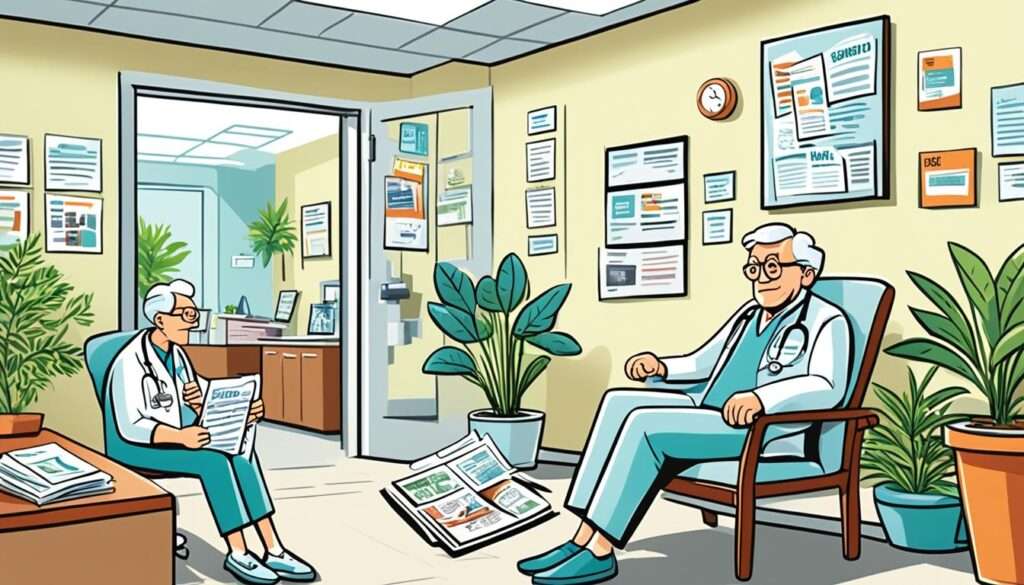
Initial Consultation and Evaluation
When you visit a GERD specialist, the first step is a detailed GERD evaluation. This meeting is key to understanding your condition and creating a treatment plan.
Medical History Review
The specialist will start by looking over your medical history. They’ll ask about your symptoms, like how often and how bad they are. They’ll also want to know what might make them worse.
They’ll talk about any treatments you’ve tried before and any health issues that might be linked to your GERD.
Physical Examination
Next, the specialist will do a careful physical examination. They’ll check your abdomen and throat. These areas are important for checking on GERD.
This check-up helps the specialist figure out what’s causing your GERD and how bad it is. It’s key for deciding what to do next. This detailed GERD evaluation leads to more tests and a treatment plan just for you.

Diagnostic Tests for GERD
Your GERD specialist may suggest various tests to confirm the diagnosis and find any underlying issues. These tests give insights into how severe your condition is and its patterns. This helps your doctor create the best treatment plan for you.
Upper Endoscopy
An upper endoscopy is a common test to check the esophagus and stomach. Your GERD specialist will use a thin, flexible tube with a camera to look inside. This lets them see if GERD has caused any damage or inflammation.
pH Monitoring
pH monitoring is key for diagnosing GERD. It measures the acidity in your esophagus over 24 hours. By tracking acid reflux episodes, your specialist can understand your condition better and plan your treatment.
These tests, along with a detailed medical history and physical check-up, help your GERD specialist make an accurate diagnosis. They can then create a personalized treatment plan to manage your GERD well.
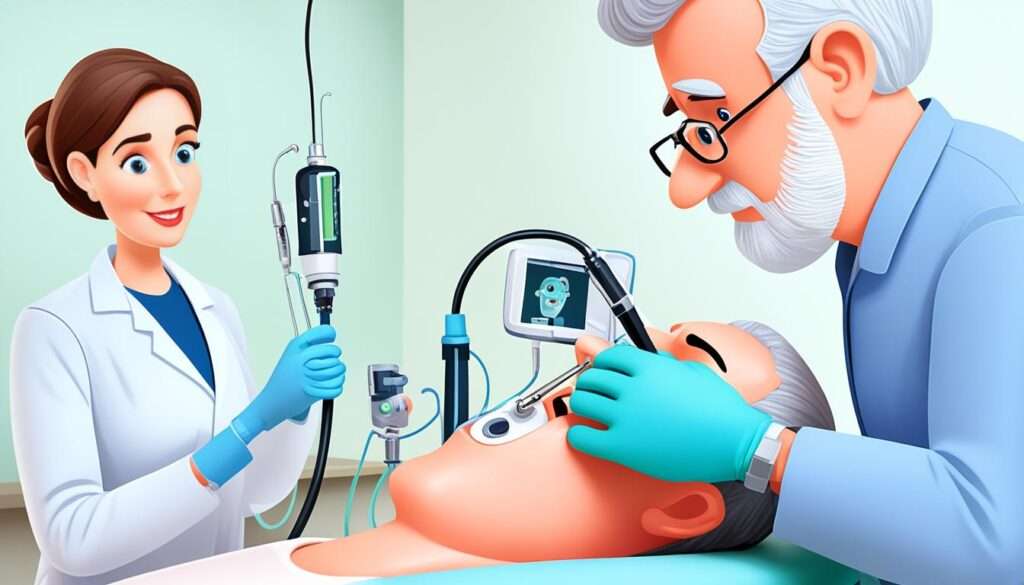
gerd specialist
Looking for help with digestive health issues like gastroesophageal reflux disease (GERD)? A GERD specialist can be a big help. These experts, often gastroenterologists, know a lot about treating stomach problems, including GERD.
They start by looking at your health history and doing a physical check-up. Then, they might do tests like an upper endoscopy or pH monitoring. This helps them understand what’s causing your GERD symptoms. With this info, they can make a treatment plan just for you.
Working with a GERD specialist means you get the newest ways to manage GERD. They keep up with the latest research and treatments. This means you get the best care for your digestive health, whether it’s changing your lifestyle, managing meds, or surgery.
Seeing a GERD expert, gastroenterologist, or digestive health specialist is a smart move for managing GERD and bettering your life. Don’t wait to talk to these experts to get the right care for your GERD.
Discussing Treatment Options
After your first check-up and tests, your GERD specialist will look at treatment options with you. The main aim is to ease your GERD symptoms and find out why you have the condition. You might get a plan that includes changing your lifestyle and taking medicines.
Lifestyle Modifications
Making lifestyle changes is often the first step in managing GERD. Your GERD specialist might suggest these changes to lessen your symptoms:
- Eating more GERD-friendly foods and avoiding trigger foods
- Keeping a healthy weight with regular exercise and balanced eating
- Changing how you sleep, like using a wedge pillow or skipping late snacks
- Stopping smoking and drinking less alcohol
Medications
If changing your lifestyle doesn’t help enough, your GERD specialist might suggest medicines. These can lessen stomach acid and ease your symptoms. Some common medicines for GERD are:
- Antacids: Work fast to neutralize stomach acid
- H2 blockers: Cut down on stomach acid production
- Proton pump inhibitors (PPIs): Block acid production more and for longer
Your GERD specialist will help create a detailed treatment plan with you. This plan will meet your specific needs and offer the best long-term relief.
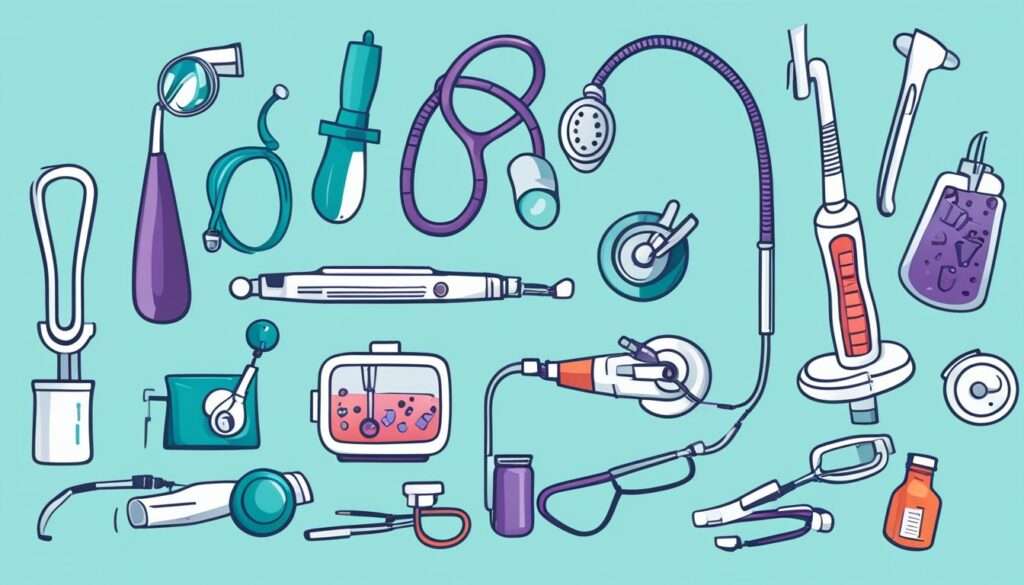
Surgical Interventions for GERD
For those with severe or ongoing GERD, surgery might be a good option. GERD surgery, or anti-reflux surgery, can help manage symptoms and protect the esophagus from further harm.
Fundoplication is a common surgery for GERD. It makes the muscle at the stomach’s bottom stronger. This muscle, called the lower esophageal sphincter, stops stomach acid from flowing back up. Doctors often suggest this for people with long-term, severe, or hard-to-treat GERD.
Other surgeries like the LINX device or TIF (Transoral Incisionless Fundoplication) are also available. These methods help strengthen the muscle at the stomach’s bottom. They aim to give lasting relief from GERD symptoms.
GERD surgery is usually for those who haven’t gotten better with lifestyle changes and medicines. Your doctor will look at your situation closely. They will talk about the best GERD treatment options for you.
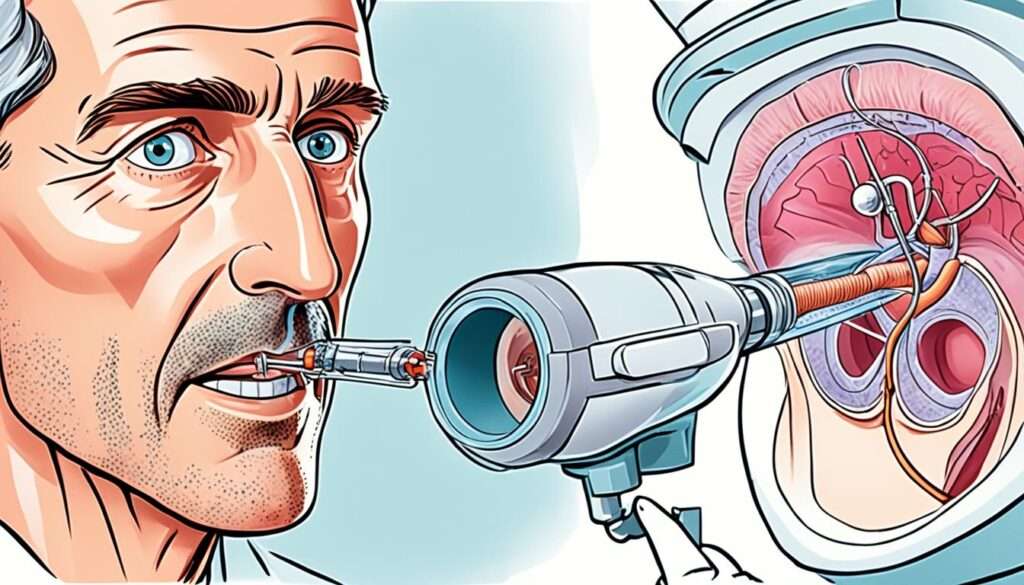
Follow-up Care and Monitoring
Managing GERD means you need ongoing care and monitoring. Even after starting treatment, your GERD specialist will keep working with you. They will help adjust your diet and lifestyle for better long-term management.
Dietary and Lifestyle Adjustments
Changing how you eat, staying active, and improving your sleep can help manage GERD. Your GERD specialist will give you advice that fits your needs and likes. This might include:
- Identifying and avoiding foods that make your GERD worse
- Using portion control and eating smaller, more frequent meals
- Adding regular exercise to keep a healthy weight
- Improving your sleep setup, like raising the head of your bed
Regular check-ins with your GERD specialist are key. They help see if your treatment is working, watch for any new issues, and adjust things as needed. This ensures the best long-term results for your GERD.
Managing Chronic GERD
If you have chronic GERD (Gastroesophageal Reflux Disease), managing it long-term is key. Your GERD specialist will help you create a plan to stop GERD flare-ups and keep your digestive system healthy.
Preventing GERD Flare-ups
Stopping GERD flare-ups means knowing and avoiding your personal GERD triggers. These could be certain foods, medicines, or habits that make your symptoms worse. Your GERD specialist can help figure out what these triggers are by tracking your diet and lifestyle.
- Maintain a healthy weight and avoid overeating
- Limit consumption of trigger foods like spicy, fried, or acidic items
- Avoid lying down after meals and elevate the head of your bed
- Quit smoking and limit alcohol intake
Long-term GERD Management
For long-term GERD management, your doctor might suggest medicines like proton pump inhibitors or H2 blockers to lower stomach acid. Sometimes, surgery like laparoscopic fundoplication is needed to strengthen the lower esophageal sphincter and stop acid reflux.
Regular check-ups and monitoring are crucial to keep your GERD under control. This way, you can adjust your treatment as needed. With the help of your GERD specialist, you can manage your chronic condition and improve your life quality.
Seeking Support and Resources
Living with GERD, or gastroesophageal reflux disease, can be tough. Getting support and learning from others can really help. Your doctor might suggest joining support groups, either in person or online. These groups let you meet people who understand what you’re going through and share tips on how to handle it. GERD support groups offer a place to belong and learn from others.
Your doctor can also give you materials and advice on where to find good GERD information. These resources can help you understand your condition better. This way, you can take a bigger part in your care and make choices about your treatment.
Looking for patient education resources is also a great step. Your doctor might suggest websites, books, or other materials about GERD. By learning more, you can get a better grasp of your condition. This helps you work better with your healthcare team to find the best treatment plan.
Being part of a GERD community can make you feel supported and empowered. Your doctor is key in helping you find the right tools and info to manage your GERD. This can greatly improve your life quality.
Conclusion
Seeing a GERD specialist is key to managing your gastroesophageal reflux disease well. They have the knowledge and experience to help you. They can ease your symptoms and prevent serious problems later.
By working with a GERD specialist, you can improve your digestive health. This means you can live a better life overall.
On your path to better health, you’ll learn a lot about GERD. You’ll understand its causes and the treatments you can try. This knowledge helps you make smart choices and work with your doctor to find the best plan for you.
Choosing to see a GERD specialist is a smart move for your health. They can help you deal with GERD and keep your digestive system healthy. With their help, you can lessen the effects of GERD on your daily life.
FAQ
What is GERD and what are its common symptoms?
GERD, or gastroesophageal reflux disease, is a condition where stomach acid flows back into the esophagus. This can cause discomfort and harm the esophagus. Symptoms include heartburn, trouble swallowing, regurgitation, coughing, and chest pain.
Why should I see a GERD specialist?
A GERD specialist, like a gastroenterologist, can offer great benefits. They know a lot about GERD and can help find the best treatments for you.
What should I bring to my appointment with a GERD specialist?
Bring important medical records and a list of questions to your visit. Include previous test results, your medication list, and a summary of your health history. Ask about GERD causes, treatment options, and lifestyle changes that help manage your condition.
What kind of tests might a GERD specialist recommend?
Your specialist might suggest tests like an upper endoscopy and pH monitoring. An upper endoscopy uses a camera tube to check the esophagus and stomach. pH monitoring tracks acidity in the esophagus for 24 hours.
What kind of treatment options are available for GERD?
Treatment options include lifestyle changes and medications. You might need to change your diet, manage your weight, and sleep better. Medicines like antacids and proton pump inhibitors can also help. In severe cases, surgery might be an option.
What kind of follow-up care and monitoring can I expect for GERD?
You’ll need ongoing care for GERD. Your specialist will help with dietary and lifestyle changes. Regular check-ups let the specialist adjust your treatment as needed for the best long-term results.
How can I manage chronic or recurring GERD?
For chronic GERD, managing it well is key. Your specialist will help you avoid triggers and plan for long-term management. This includes lifestyle changes and medication if needed.
What kind of support and educational resources are available for GERD?
There are many resources for GERD management. Your specialist might suggest support groups or online communities. They can also provide information and guidance to help you understand and manage your condition.
Source Links
About The Author

Medically reviewed by Dr. Nivedita Pandey, MD, DM (Gastroenterology)
Dr. Nivedita Pandey is a U.S.-trained gastroenterologist and hepatologist with extensive experience in diagnosing and treating liver diseases and gastrointestinal disorders. She specializes in liver enzyme abnormalities, fatty liver disease, hepatitis, cirrhosis, and digestive health.
All content is reviewed for medical accuracy and aligned with current clinical guidelines.





